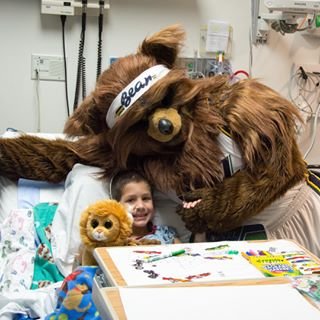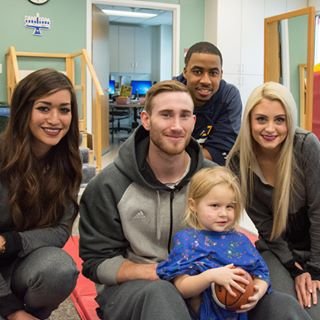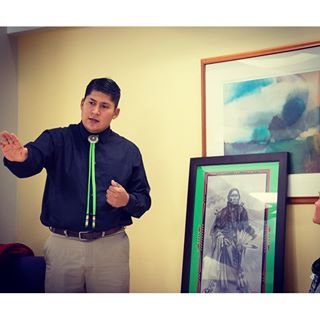Measles has been in the news again recently, as cases identified in California continue to increase and a third Utah County resident tested positive for measles in mid-January.
Measles, also called rubeola, is a highly contagious respiratory infection caused by a virus. While it is best known for its typical skin rash, it also brings about flu-like symptoms, including fever, cough, and a runny nose.
What You Need To Know
Measles is very rare, and a child who is properly vaccinated is extremely unlikely to contract the disease.
Because as many as 30-50% of people who get measles are hospitalized for complications, it’s important for public health officials to contain an outbreak.
For more information about the current outbreak, visit:health.utah.gov/measles.
Recent Outbreaks
According to the CDC, From January 1-23, 2015, 68 people from 11 states were reported to have measles. Most of these cases are part of a large, ongoing outbreak that originated in an amusement park in California. In 2008, 2011, 2013 and 2014, there were more reported measles cases compared with previous years. CDC experts attribute this to more measles cases than usual in some countries, such as in Europe, where Americans travel more often, and the spread of measles in U.S. communities with pockets of unvaccinated people. The CDC web site also details all major outbreaks of measles over the past few years.
Signs and Symptoms
While measles is probably best known for its full-body rash, the first symptoms of the infection are usually a hacking cough, runny nose, high fever, and red eyes. A characteristic marker of measles are small red spots with blue-white centers that appear inside the mouth.
The measles rash typically has a red or reddish brown blotchy appearance, and first usually shows up on the forehead, then spreads downward over the face, neck, and body, then down to the arms and feet.
Measles is highly contagious — 90% of people who haven’t been vaccinated for measles will get it if they live in the same household as an infected person. Measles is spread when someone comes in direct contact with infected droplets or when someone with measles sneezes or coughs and spreads virus droplets through the air.
A person with measles is contagious from 1 to 2 days before symptoms start until about 4 days after the rash appears.
Prevention
Infants are generally protected from measles for 6 months after birth due to immunity passed on from their mothers. Older kids are usually immunized against measles according to state and school health regulations.
For most kids, the measles vaccine is part of the measles-mumps-rubella immunization (MMR) or measles-mumps-rubella-varicella immunization (MMRV) given at 12 to 15 months of age and again at 4 to 6 years of age.
Measles vaccine is not usually given to infants younger than 12 months old. But if there’s a measles outbreak, or a child will be traveling outside the United States, the vaccine may be given when a child is 6-11 months old, followed by the usual MMR immunization at 12-15 months and 4-6 years.
As with all immunization schedules, there are important exceptions and special circumstances. Your doctor will have the most current information regarding recommendations about the measles immunization.
The measles vaccine should not be given to these at-risk groups:
- pregnant women
- kids with untreated tuberculosis, leukemia, or other cancers
- people whose immune systems are suppressed for any reason
- kids who have a history of severe allergic reaction to gelatin or to the antibiotic neomycin, as they are at risk for serious reactions
During a measles outbreak, an injection of measles antibodies called immune globulin can help protect people who have not been immunized (especially those at risk of serious infection, such as pregnant women, infants, or kids with weakened immune systems) if it’s given within 6 days of exposure. These antibodies can either prevent measles or make symptoms less severe.
For women who are not pregnant and people not in one of the other at-risk groups mentioned above, the measles vaccine may offer some protection if given within 72 hours of measles exposure.
Vaccine Side Effects
The measles vaccine occasionally causes side effects in kids who don’t have underlying health problems. The most common reactions are fever 6-12 days after vaccination (in about 5%-15% of kids vaccinated) and a measles-like rash, which isn’t contagious and fades on its own (in about about 5% of vaccinated kids).
Treatment
There is no specific medical treatment for measles. To help manage symptoms, which usually last for about 2 weeks, give your child plenty of fluids and encourage extra rest. If fever is making your child uncomfortable, you may want to give a non-aspirin fever medication such as acetaminophen or ibuprofen. Remember, you should never give aspirin to a child who has a viral illness since the use of aspirin in such cases has been associated with the development of Reye syndrome.
Kids with measles should be closely watched. In some cases, measles can lead to other complications, such as otitis media, croup, diarrhea, pneumonia, and encephalitis (a serious brain infection), which may require antibiotics or hospitalization.
In developing countries, vitamin A has been found to decrease complications and death associated with measles infections. In the U.S., vitamin A supplementation should be considered for children between 6 months and 2 years old who are hospitalized with measles and its complications.
Also, all kids over 6 months old with certain risk factors — such as vitamin A deficiency, a weakened immune system, or malnutrition — might benefit from vitamin A supplementation.
When to Call the Doctor
Call the doctor immediately if you suspect that your child has measles. It’s important to get medical care following measles exposure, especially if your child:
- is an infant
- is taking medicines that suppress the immune system
- has tuberculosis, cancer, or a disease that affects the immune system
Remember that measles, a once common childhood disease, is preventable through routine childhood immunization. Additionally, please contact the Utah Department of Health if you think your child may have measles.
Additional Reading
- Vaccines: Fact and Fiction
- The Risks of Avoiding or Postponing Vaccination
About the Author
Share This Article
Search Our Blog
Our Instagram
 primarychildrens
245
Likes
2
Comments
primarychildrens
245
Likes
2
Comments
 primarychildrens
399
Likes
5
Comments
primarychildrens
399
Likes
5
Comments
 primarychildrens
324
Likes
2
Comments
primarychildrens
324
Likes
2
Comments
 primarychildrens
304
Likes
8
Comments
primarychildrens
304
Likes
8
Comments
 primarychildrens
149
Likes
primarychildrens
149
Likes
 primarychildrens
143
Likes
1
Comments
primarychildrens
143
Likes
1
Comments
 primarychildrens
156
Likes
2
Comments
primarychildrens
156
Likes
2
Comments
 primarychildrens
185
Likes
2
Comments
primarychildrens
185
Likes
2
Comments

Recent Posts
- Is it the Cold or the Flu? December 18, 2015
- Play it Safe Outside this Winter December 15, 2015
- 10 Tips for Choosing Safe Toys this Christmas + [Infographic] December 10, 2015
- The Air We Breathe: Protecting Your Kids During an Inversion December 3, 2015
- Think BIG on #GivingTuesday and Support Childhood Cancer Research November 30, 2015
Our Most Popular Posts
 Why Kids Shouldn’t Wear Bulky Coats in Car Seats 27 views
Why Kids Shouldn’t Wear Bulky Coats in Car Seats 27 views  Celebrating the First X-Ray and Radiology’s Contributions to Children’s Health Care 16 views
Celebrating the First X-Ray and Radiology’s Contributions to Children’s Health Care 16 views  On Childhood Cancer: Perspectives of a Pediatric Oncologist 14 views
On Childhood Cancer: Perspectives of a Pediatric Oncologist 14 views  Six Ways Child Life Specialists Improve Your Child’s Hospital Stay 14 views
Six Ways Child Life Specialists Improve Your Child’s Hospital Stay 14 views  Giving Thanks … For Everything 13 views
Giving Thanks … For Everything 13 views  A Guide to Flying with Special Needs Children 12 views
A Guide to Flying with Special Needs Children 12 views - Bone Fractures: From Break to Cast Removal 12 views
 Play it Safe Outside this Winter 11 views
Play it Safe Outside this Winter 11 views  How VEPTR Helps Patients with Thoracic Insufficiency Syndrom (T.I.S.) 11 views
How VEPTR Helps Patients with Thoracic Insufficiency Syndrom (T.I.S.) 11 views  Groundbreaking Research Studying Cancer in Elephants Spurs New Funding for Childhood Cancer 11 views
Groundbreaking Research Studying Cancer in Elephants Spurs New Funding for Childhood Cancer 11 views
Archives
- December 2015 (4)
- November 2015 (8)
- October 2015 (8)
- September 2015 (2)
- August 2015 (1)
- July 2015 (3)
- June 2015 (2)
- May 2015 (2)
- March 2015 (3)
- February 2015 (2)
- January 2015 (2)
- November 2014 (1)
- October 2014 (1)
- September 2014 (3)
- August 2014 (2)
- July 2014 (4)
- June 2014 (2)
- May 2014 (4)
- April 2014 (6)
- March 2014 (4)
- February 2014 (1)
- September 2013 (1)
- February 2013 (1)
- June 2012 (1)














Add comment